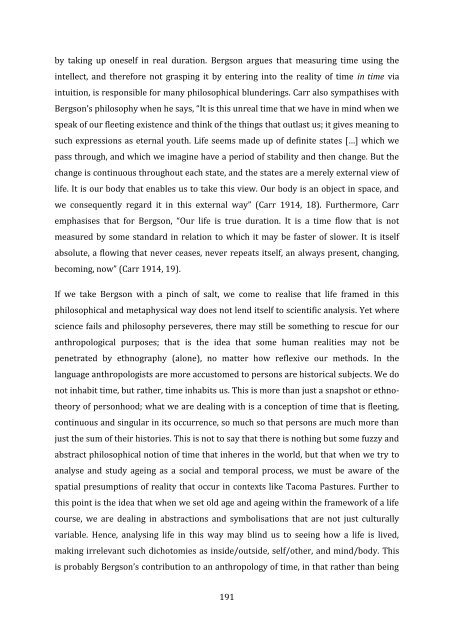Philip Y. Kao PhD thesis - Research@StAndrews:FullText
Philip Y. Kao PhD thesis - Research@StAndrews:FullText
Philip Y. Kao PhD thesis - Research@StAndrews:FullText
Create successful ePaper yourself
Turn your PDF publications into a flip-book with our unique Google optimized e-Paper software.
y taking up oneself in real duration. Bergson argues that measuring time using the<br />
intellect, and therefore not grasping it by entering into the reality of time in time via<br />
intuition, is responsible for many philosophical blunderings. Carr also sympathises with<br />
Bergson’s philosophy when he says, “It is this unreal time that we have in mind when we<br />
speak of our fleeting existence and think of the things that outlast us; it gives meaning to<br />
such expressions as eternal youth. Life seems made up of definite states […] which we<br />
pass through, and which we imagine have a period of stability and then change. But the<br />
change is continuous throughout each state, and the states are a merely external view of<br />
life. It is our body that enables us to take this view. Our body is an object in space, and<br />
we consequently regard it in this external way” (Carr 1914, 18). Furthermore, Carr<br />
emphasises that for Bergson, “Our life is true duration. It is a time flow that is not<br />
measured by some standard in relation to which it may be faster of slower. It is itself<br />
absolute, a flowing that never ceases, never repeats itself, an always present, changing,<br />
becoming, now” (Carr 1914, 19).<br />
If we take Bergson with a pinch of salt, we come to realise that life framed in this<br />
philosophical and metaphysical way does not lend itself to scientific analysis. Yet where<br />
science fails and philosophy perseveres, there may still be something to rescue for our<br />
anthropological purposes; that is the idea that some human realities may not be<br />
penetrated by ethnography (alone), no matter how reflexive our methods. In the<br />
language anthropologists are more accustomed to persons are historical subjects. We do<br />
not inhabit time, but rather, time inhabits us. This is more than just a snapshot or ethnotheory<br />
of personhood; what we are dealing with is a conception of time that is fleeting,<br />
continuous and singular in its occurrence, so much so that persons are much more than<br />
just the sum of their histories. This is not to say that there is nothing but some fuzzy and<br />
abstract philosophical notion of time that inheres in the world, but that when we try to<br />
analyse and study ageing as a social and temporal process, we must be aware of the<br />
spatial presumptions of reality that occur in contexts like Tacoma Pastures. Further to<br />
this point is the idea that when we set old age and ageing within the framework of a life<br />
course, we are dealing in abstractions and symbolisations that are not just culturally<br />
variable. Hence, analysing life in this way may blind us to seeing how a life is lived,<br />
making irrelevant such dichotomies as inside/outside, self/other, and mind/body. This<br />
is probably Bergson’s contribution to an anthropology of time, in that rather than being<br />
191
















